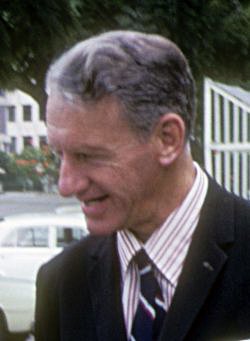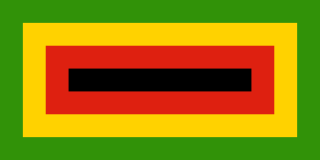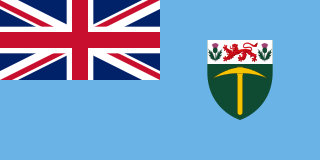Notes and references
Notes
- 1 2 The Rhodesian Front was succeeded in 1981 by the Republican Front, and in 1984 by the Conservative Alliance of Zimbabwe.
- 1 2 Includes members of the Independent Zimbabwe Group, a bloc formed by white independent MPs in 1983.
- 1 2 Makunde was convicted of ordering seven followers to burn down ZAPU offices.
- 1 2 Ndlovu was assassinated by ZAPU rebels at his home in Beitbridge, Matabeleland South.
- 1 2 3 4 5 6 7 8 9 10 11 12 13 14 15 16 17 18 19 20 21 22 23 24 25 26 27 28 29 30 31 32 33 34 35 36 37 38 39 40 41 42 43 44 45 The Rhodesian Front was succeeded in 1981 by the Republican Front, and in 1984 by the Conservative Alliance of Zimbabwe.
- ↑ Hamilton Ritchie was succeeded on 11 February 1981 by Archie Wilson. Wilson resigned in 1982 and was succeeded by Esme Scott in August 1982.
- ↑ Savage was succeeded by Brian Grubb in May 1983.
- ↑ Masango was appointed high commissioner to Tanzania. He was succeeded by Moton Malianga in January 1981.
- ↑ Chambati was appointed ambassador to West Germany. He was succeeded by Josiah Chinamano in January 1981. Chinamano died on 1 October 1984 and was succeeded by Kenneth Mano.
- ↑ Mangena was succeeded by Sikajaya Andrew Muntanga on 25 August 1982.
- ↑ Ndlovu missed 21 consecutive sittings of Parliament, the threshold for expulsion. He had fled to Zambia.
- ↑ Victoria Province was renamed Masvingo Province in 1982.
- ↑ Bassopo Moyo served in Parliament until his 1984 criminal conviction.
- ↑ Smith was succeeded by John Probert in July 1981.
- ↑ Walker was succeeded by Guybon Cumming on 18 January 1983.
- 1 2 Beginning in December 1981, Stuttaford was detained by Zimbabwean authorities under emergency powers. He was later released before being detained again.
- ↑ Cronjé resigned to take a job offer outside Zimbabwe. He was succeeded by Tony Berkhout in February 1982.
- ↑ Gaunt was succeeded by James Thrush in January 1981.
- ↑ Goddard was succeeded by Peter Field in February 1984.
- ↑ Tapson was succeeded by Jock Kay in October 1983.
- ↑ Holland was succeeded by Geoff York in July 1981.
- ↑ Moseley was succeeded by Desmond Chalmers in April 1982.
- ↑ Savage was murdered at his Matabeleland farm by ZAPU rebels.
- ↑ Thrush was elected as a Rhodesian Front member, but resigned to become an independent on 4 March 1982.
- ↑ Holland ran unsuccessfully as the Democratic Party candidate in the by-election to win his former seat.
- ↑ York was elected as a Rhodesian Front member, but resigned to become an independent in 1985.
- ↑ Cronjé emigrated to take a job offer in another Southern African country.
- ↑ Goddard died in a fall over a waterfall.
Related Research Articles

Rhodesia, officially from 1970 the Republic of Rhodesia, was an unrecognised state in Southern Africa from 1965 to 1979. During this fourteen-year period, Rhodesia served as the de facto successor state to the British colony of Southern Rhodesia, and in 1980 it became modern day Zimbabwe.
The Gukurahundi was a series of mass killings and Genocide in Zimbabwe which were committed from 1983 until the Unity Accord in 1987. The name derives from a Shona-language term which loosely translates to "the early rain which washes away the chaff before the spring rains".

Ian Douglas Smith was a Rhodesian politician, farmer, and fighter pilot who served as Prime Minister of Rhodesia from 1964 to 1979. He was the country's first leader to be born and raised in Rhodesia, and led the predominantly white government that unilaterally declared independence from the United Kingdom in November 1965 in opposition to their demands for the implementation of majority rule as a condition for independence. His 15 years in power were defined by the country's international isolation and involvement in the Rhodesian Bush War, which pitted the Rhodesian Security Forces against the Soviet and Chinese-funded military wings of the Zimbabwe African National Union (ZANU) and Zimbabwe African People's Union (ZAPU).

Zimbabwe Rhodesia, alternatively known as Zimbabwe-Rhodesia, also informally known as Zimbabwe or Rhodesia, was a short-lived sovereign state that existed from 1 June 1979 to 18 April 1980, though it lacked international recognition. Zimbabwe Rhodesia was preceded by another state named the Republic of Rhodesia and was briefly under a British-supervised transitional government sometimes referred to as a reestablished Southern Rhodesia, which according to British constitutional theory had remained the lawful government in the area after Unilateral Declaration of Independence (UDI) in 1965. About three months later, the re-established colony of Southern Rhodesia was granted internationally-recognized independence within the Commonwealth as the Republic of Zimbabwe.

The Zimbabwe African National Union – Patriotic Front (ZANU–PF) is a political organisation which has been the ruling party of Zimbabwe since independence in 1980. The party was led for many years by Robert Mugabe, first as prime minister with the Zimbabwe African National Union (ZANU) and then as president from 1987 after the merger with the Zimbabwe African People's Union (ZAPU) and retaining the name ZANU–PF, until 2017, when he was removed as leader.

The Rhodesian Bush War, also known as the Second Chimurenga, was a civil/anti communist conflict from July 1964 to December 1979 in the unrecognised country of Rhodesia.

The Internal Settlement was an agreement which was signed on 3 March 1978 between Prime Minister of Rhodesia Ian Smith and the moderate African nationalist leaders comprising Bishop Abel Muzorewa, Ndabaningi Sithole and Senator Chief Jeremiah Chirau. After almost 15 years of the Rhodesian Bush War, and under pressure from the sanctions placed on Rhodesia by the international community, and political pressure from South Africa, the United Kingdom, and the United States, the Rhodesian government met with some of the internally based moderate African nationalist leaders in order to reach an agreement on the political future for the country.

Parliamentary elections were held in Zimbabwe in June and July 1985. The result was a victory for the ruling ZANU–PF party led by Robert Mugabe, which increased its majority in parliament.

General elections were held in Southern Rhodesia between 14 February and 4 March 1980 to elect the members of the House of Assembly of the first Parliament of the independent Zimbabwe. As stipulated by the new Constitution of Zimbabwe produced by the Lancaster House Conference, the new House of Assembly was to comprise 100 members, 80 of whom would be elected proportionally by province by all adult citizens on a common roll, and 20 of whom would be elected in single-member constituencies by whites on a separate roll.

The military history of Zimbabwe chronicles a vast time period and complex events from the dawn of history until the present time. It covers invasions of native peoples of Africa, encroachment by Europeans, and civil conflict.
Tichafa Samuel Parirenyatwa was Zimbabwe's first trained black physician, medical doctor and the first vice-president of the Zimbabwe African People's Union (ZAPU). He rose to prominence during ZAPU's political struggle against the colonial administration in Southern Rhodesia.

The Geneva Conference took place in Geneva, Switzerland during the Rhodesian Bush War. Held under British mediation, its participants were the unrecognised government of Rhodesia, led by Ian Smith, and a number of rival Rhodesian black nationalist parties: the African National Council, led by Bishop Abel Muzorewa; the Front for the Liberation of Zimbabwe, led by James Chikerema; and a joint "Patriotic Front" made up of Robert Mugabe's Zimbabwe African National Union and the Zimbabwe African People's Union led by Joshua Nkomo. The purpose of the conference was to attempt to agree on a new constitution for Rhodesia and in doing so find a way to end the Bush War raging between the government and the guerrillas commanded by Mugabe and Nkomo respectively.

The Victoria Falls Conference took place on 26 August 1975 aboard a South African Railways train halfway across the Victoria Falls Bridge on the border between the unrecognised state of Rhodesia and Zambia. It was the culmination of the "détente" policy introduced and championed by B. J. Vorster, the Prime Minister of South Africa, which was then under apartheid and was attempting to improve its relations with the Frontline States to Rhodesia's north, west and east by helping to produce a settlement in Rhodesia. The participants in the conference were a delegation led by the Rhodesian Prime Minister Ian Smith on behalf of his government, and a nationalist delegation attending under the banner of Abel Muzorewa's African National Council (UANC), which for this conference also incorporated delegates from the Zimbabwe African National Union (ZANU), the Zimbabwe African People's Union (ZAPU) and the Front for the Liberation of Zimbabwe (FROLIZI). Vorster and the Zambian President Kenneth Kaunda acted as mediators in the conference, which was held on the border in an attempt to provide a venue both sides would accept as neutral.
The 1981 Entumbane uprising, also known as the Battle of Bulawayo or Entumbane II, occurred between 8 and 12 February 1981 in and around Bulawayo, Zimbabwe amid political tensions in the newly independent state. Zimbabwe People's Revolutionary Army (ZIPRA) guerrillas, mainly in the city's western suburb of Entumbane, rebelled, creating a situation that threatened to develop into a fresh civil war, barely a year after the end of the Bush War. The Rhodesian African Rifles (RAR) and other white-commanded elements of the former Rhodesian Security Forces, fighting for the Zimbabwean government as part of the new Zimbabwe National Army, put down the uprising. Groups of Zimbabwe African National Liberation Army (ZANLA) fighters attacked both ZIPRA and the government forces during the revolt, which followed a smaller outbreak of fighting between guerrillas in November 1980.
Thenjiwe Lesabe was a Zimbabwean nationalist who was also a teacher, war veteran and political activist.
Lazarus Nkala, known in political circles by the nickname UMavava, was a Rhodesian trade union leader, activist, and revolutionary. Born in Filabusi in Matabeleland, he attended mission and government schools, and trained as a builder. He worked in Bulawayo, and became a union leader and African nationalist activist. In the 1950s and 60s, he served in leadership roles in the Southern Rhodesia African National Congress, National Democratic Party, and Zimbabwe African People's Union. He was detained in 1964 and, with the exception of a three-week period the following year, was held in continuous detention for the next ten years. Upon his release in 1974, he was named Organising Secretary of the ANC, and attended the Victoria Falls Conference as part of Joshua Nkomo's delegation. He died shortly after in an automobile accident while driving from Salisbury to Bulawayo.
Tizirai Annas Gwata is a medical doctor and politician who served as the first black mayor of Harare, from 1981 to 1984. He also served as a Harare city councillor for Ward 31. Gwata also lectured as the first full time black lecturer of medicine at the University of Zimbabwe. He retired from political life at the end of his term as mayor in 1985, choosing to focus full time on his medical practice and farming.

David Colville Smith was a farmer and politician in Rhodesia and its successor states, Zimbabwe Rhodesia and Zimbabwe. He served in the cabinet of Rhodesia as Minister of Agriculture from 1968 to 1976, Minister of Finance from 1976 to 1979, and Minister of Commerce and Industry from 1978 to 1979. From 1976 to 1979, he also served Deputy Prime Minister of Rhodesia. He continued to serve as Minister of Finance in the government of Zimbabwe Rhodesia in 1979. In 1980, he was appointed Minister of Trade and Commerce of the newly independent Zimbabwe, one of two whites included in the cabinet of Prime Minister Robert Mugabe.

Rhodesia, was a self-governing British Crown colony in southern Africa. Until 1964, the territory was known as Southern Rhodesia, and less than a year before the name change the colony formed a part of the Federation of Rhodesia and Nyasaland and hosted its capital city, Salisbury. On 1 January 1964, the three parts of the Federation became separate colonies as they had been before the founding of the Federation on 1 August 1953. The demise of the short-lived union was seen as stemming overwhelmingly from black nationalist movements in Northern Rhodesia and Nyasaland, and both colonies were fast-tracked towards independence - Nyasaland first, as Malawi, on 6 July 1964 and Northern Rhodesia second, as Zambia, on 24 October. Southern Rhodesia, by contrast, stood firmly under white government, and its white population, which was far larger than the white populations elsewhere in the erstwhile Federation, was, in general, strongly opposed to the introduction of black majority rule. The Southern Rhodesian prime minister, Winston Field, whose government had won most of the federation's military and other assets for Southern Rhodesia, began to seek independence from the United Kingdom without introducing majority rule. However, he was unsuccessful and his own party, the Rhodesian Front, forced him to resign. Days prior to his resignation, on Field's request, Southern Rhodesia had changed its flag to a sky blue ensign defaced with the Rhodesian coat of arms, becoming the first British colony to use a sky blue ensign instead of a dark blue one.

Callistus Dingiswayo Ndlovu was a Zimbabwean academic, diplomat, and politician. He joined the Zimbabwe African People's Union (ZAPU) in 1963 as a teacher in Matabeleland, and went on to serve as its representative to the United Nations and North America in the 1970s. After Zimbabwe's independence in 1980, he was a member of the House of Assembly from 1980 to 1985 and served as a senator from 1985 to 1990. He left ZAPU and joined the ruling ZANU–PF party in 1984.
References
- 1 2 3 4 Africa Research Bulletin. Blackwell. 1980. p. 5927.
- 1 2 Zimbabwe News. Zimbabwe African National Union. 1998. p. 11.
- 1 2 3 Sub-Saharan Africa Report. Foreign Broadcast Information Service. 1981. p. 135.
- 1 2 3 Zimbabwe, a Country Study. U.S. Department of the Army. 1983. p. 214.
- 1 2 3 4 Foisie, Jack (16 July 1981). "Ian Smith Political Gains Aggravate Zimbabwe's Black-White Relations". Los Angeles Times. Retrieved 8 April 2020.
- 1 2 3 Annual of Power and Conflict. Institute for the Study of Conflict. 1982.
- 1 2 3 Sub-Saharan Africa Report. Foreign Broadcast Information Service. 1982.
- 1 2 3 4 5 6 7 8 "MP quit 'to enjoy rest of my life'" (PDF). The Star. 5 January 1982. Retrieved 9 April 2020.
- 1 2 3 Sub-Saharan Africa Report. Foreign Broadcast Information Service. 1985. p. 108.
- 1 2 3 4 5 6 7 8 9 Ross, Jay (4 March 1982). "White Party Splits in Zimbabwe". Washington Post. Retrieved 9 April 2020.
- 1 2 3 4 News Bulletin. The Project. 1982. p. 20.
- ↑ "White party in Zimbabwe suffers another defection". Christian Science Monitor. 10 March 1982. Retrieved 8 April 2020.
- 1 2 3 Ross, Jay (9 April 1982). "Whites Rebuff Mugabe's Election". Washington Post. Retrieved 9 April 2020.
- 1 2 3 Service, British Broadcasting Corporation Monitoring (1982). Summary of World Broadcasts: Non-Arab Africa.
- 1 2 3 4 5 Chikova, Lovemore (9 June 2003). "House Resumes Sitting Tomorrow". The Herald. Retrieved 9 April 2020.
- 1 2 3 4 5 Parliamentary Debates. House of Assembly of Zimbabwe. 1982. p. 799.
- 1 2 Parliamentary Debates. Zimbabwe House of Assembly. 1983. p. 23.
- 1 2 3 4 Keesing's Contemporary Archives. Keesing's Limited. 1983. p. 757.
- 1 2 3 4 Southern Africa Report. Southern Africa Report Association. 1984. p. 80.
- 1 2 "Nationalist leader Chinamano dies". UPI. 2 October 1984. Retrieved 9 April 2020.
- 1 2 3 Keesing's Contemporary Archives. Keesing's Limited. 1985.
- 1 2 "MP quits". The Guardian. 7 December 1984. Retrieved 9 April 2020.
- 1 2 Independent Zimbabwe. Department of Information, Government of Zimbabwe. 1985. p. 4.
- 1 2 Human Rights Internet Reporter. 1985. p. 358.
- 1 2 3 4 5 6 7 8 9 10 11 12 13 14 15 16 17 18 19 20 21 22 23 24 25 26 27 28 29 30 31 32 33 34 A Concise Guide to the First Parliament of Zimbabwe. Ministry of Information, Posts and Telecommunications Publication of Zimbabwe. 1984. p. 25.
- 1 2 3 4 5 6 7 8 9 10 11 12 13 14 15 16 17 18 19 20 21 22 23 24 25 26 27 28 29 30 31 32 33 34 35 36 37 38 39 40 41 42 Cary, Robert; Mitchell, Diana (1980). "Parliament of Zimbabwe - 1980 - Senators". African Nationalist Leaders - Rhodesia to Zimbabwe.
- 1 2 "Zimbabwe trial". The Age. 7 January 1982. Retrieved 9 April 2020.
- 1 2 "2 Zimbabwe Opposition Officials Dismissed". The New York Times. 13 November 1984. ISSN 0362-4331 . Retrieved 10 April 2020.
- ↑ A Concise Guide to the First Parliament of Zimbabwe. Ministry of Information, Posts and Telecommunications Publication for the Government of Zimbabwe. 1984. p. 17.
- ↑ Cary, Robert; Mitchell, Diana (1980). "Members of Parliament - Government of Zimbabwe 1980". African Nationalist Leaders - Rhodesia to Zimbabwe.
- ↑ Summary of World Broadcasts: Non-Arab Africa. British Broadcasting Corporation. 1981. p. 6.
- 1 2 3 Keesing's Contemporary Archives. Keesing's Limited. 1983. p. 477.
- ↑ News Bulletin. Zimbabwe Project. 1982. p. 5.
- ↑ Kalley, Jacqueline Audrey; Schoeman, Elna; Andor, Lydia Eve (1999). Southern African Political History: A Chronology of Key Political Events from Independence to Mid-1997. Greenwood Publishing Group. p. 723. ISBN 978-0-313-30247-3.
- ↑ Sub-Saharan Africa Report. Foreign Broadcast Information Service. 1980. p. 201.
- 1 2 Mitchell, Diana (1982). Who's Who, 1981-82: Nationalist Leaders in Zimbabwe. pp. 75–77. ISBN 978-0-7974-0497-7.
- ↑ Africa Research Bulletin. Blackwell. 1982. p. 6800.